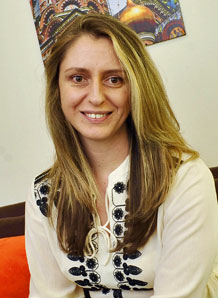Battling Electoral Misinformation on Social Media in Low Digital Literacy Environments: Lessons and Solutions from Northern Ghana
UKRI, Global Challenges Research Fund
Profile

Dr Elena Gadjanova
Senior Lecturer in Comparative Politics
Amory
I study political communication, elections, and ethnic politics with a focus on Sub-Saharan Africa. My work combines extensive fieldwork with statistical methods and survey experiments to examine parties' campaign strategies, targeting decisions, and electoral appeals, and the effects these have on citizens' self-identification, trust in government, and support for democracy.
Much of my research to date has focused on political rhetoric and ethnic appeals, although I have also written on how rising electoral competitiveness transforms clientelism in Africa. My book manuscript examines how politicians reach across ethnic lines in Africa's highly diverse states.
More broadly, I am interested in the challenges and opportunities rising diversity presents to governance, institutions, and democracy worldwide. My work is motivated by a desire to better understand, and ultimately help to overcome, sources of polarization in plural societies.
Personal website: elenagadjanova.com
Research group links
Research interests
My research interests are in the fields of comparative politics, African politics, ethnicity and ethnic politics, and comparative democratization.
Research supervision
I welcome projects related to African politics, nationalism and ethnic politics, comparative democratization, and the role of social media in politics.
Research students
Titilayo Ayoola, co-supervised with Prof. Claire Dunlop.
Bashir Bala, co-supervised with Prof. Sergio Catignani.
Tareq Hawari, co-supervised with Dr. Klejda Mulaj.
External impact and engagement
I currently lead a research project on the role of social media in politics in Ghana and have engaged with a range of civil society organizations over the course of the project, including the Media Foundation for West Africa, the Ghana Center for Democratic Development, and the Ghana Institute for Democratic Governance.
The project's website is here. On 7 February, we briefed the Foreign and Commonwealth Office on its findings and on comparative insights on social media and democracy from Ghana, Kenya, Nigeria, Sierra Leone, and Uganda.
I have also recently written for the Sueddeutsche Zeitung, the Max Planck Society, and "Democracy in Africa".
In August 2018, I spoke to members of the Commonwealth Association of Tax Administrators about how senior tax officials can overcome political and structural challenges to build trust in local tax authorities as part of a 2-week training programme in the UK.
Modules taught
- POL1029 - Introduction to Comparative Politics
- POL3227 - Politics, Elections, and the State in Africa
- POL3231 - Research Experience
- POLM088 - State-building after Civil War
Biography
Prior to joining the University of Exeter, I was a Departmental Lecturer at the Blavatnik School of Government, Oxford University, a Fung Global Fellow at the Princeton Institute of International and Regional Studies, and a Post-doctoral Fellow at the Max Planck Institute for the Study of Religious and Ethnic Diversity.
I hold a PhD in Political Science from the Graduate Institute of International and Development Studies in Geneva, Switzerland and an MPhil in International Relations from Cambridge University.
